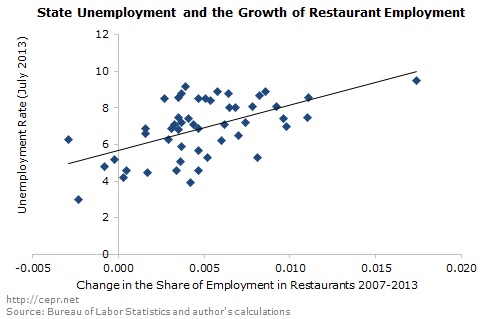September 20, 2013
Laura Tyson used her NYT column to warn about increasing wage inequality as more middle class jobs are eliminated. The centerpiece in this argument is that most of the jobs being created in the recovery are in low-paying sectors of the economy. In effect retail and restaurant jobs are replacing manufacturing and construction jobs.
This is a serious concern, since obviously we care not just that workers have jobs, but also that the jobs pay enough to support them and their families. However, the story of job quality and the story of too few jobs are arguably the same story. There are always employers offering bad jobs, but workers don’t take them in a good economy. In a bad economy they have no choice.
The chart below shows the relationship by state between the unemployment rate and the increase in the share of restaurant jobs. The upward slope (which is significant at a 1.0 percent level), shows that a higher rate of unemployment is associated with proportionately more growth in restaurant work. (Arin Dube has a related post showing that an increasing number of college educated workers are being employed in fast food restaurants.)
Click for a more detailed version of the graph.
The point here is that the shortage of jobs and the poor quality of the jobs that are being created are not different stories, they are the same story. The fact that we see the highest rise in the share of restaurant employment in states with the highest unemployment rates indicates that these low-paying jobs are associated with weak growth rather than being the direction of the future economy. If we got more job growth, then the share of low-paying jobs would surely diminish.
As another angle on this, even the wages in low-paying jobs would likely rise if we again got the economy close to full employment levels of output. This was certainly the case in the late 1990s when even workers at the bottom of the pay ladder were seeing substantial gains in wages.
This is not to say that we don’t have structural problems in the economy. An out of control financial sector continues to siphon off hundreds of billions of dollars a year from the productive economy. Our health care system is incredibly wasteful, causing us to pay more than twice as much per person as the average for other wealthy countries. However, the bad jobs story is largely the same thing as the too few jobs story. If we can just get the forbidden topics of stimulus or a lower valued dollar back on the agenda, we could address both.








Comments